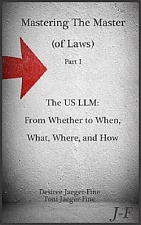Book review, Education and Science, EU – Baltic States, Latvia, USA
International Internet Magazine. Baltic States news & analytics
Saturday, 20.04.2024, 12:06
Vademecum to law studies in the United States
 Print version
Print version |
|---|
The EU and US legal systems are the biggest in the world, though the systems varied. Hence, the need to take into account the specifics in both. The best guide to ways of getting closer to the EU law is the newly published vademecum to master studies in laws in the United States*).
The book consists of an introduction, four parts and a conclusion. The first part (with 8 chapters) is about the basic issues to consider before deciding to apply for LLM (Master of Laws degree); the second part (with 3 chapters) is about the process of choosing a law school or a legal program in the US; the third part is wholly devoted to the complicated application process, and the fourth part explains the final steps of admission process and selecting a study program.
*) Mastering the Masters (of laws). The US LLM: from whether to when, what, where and how (part I), By Desiree Jaeger-Fine and Toni Jaeger-Fine. – Jaeger-Fine Publ. – N.Y., 2014.-58 pp.
Deciding to apply for a degree, as well as seeking admission to, selecting, and finally pursuing an LLM program is a deliberate and organized process, the authors argue. Therefore, the guide is intended to function as a “simple and straightforward workbook” to walk the applicant through the whole process – from an inception of the idea, to the admission – in a most efficient way (p.8).
About the authors
The authors do know what they are writing about: one of the authors (Desiree Jaeger-Fine) holds law degrees from both Germany (University of Bonn) and the US (Fordham), from which she graduated cum laude with a master degree in Intellectual Property and Information Technology Law.
Another author (Toni Jaeger-Fine) is a graduate of Duke Law School and the State University of New York. She is Assistant Dean for International and Non-J.D. Programs at Fordham Law School, where she is a director of the International Judicial Research and Training Program, and co-director of the Summer Institute in New York City.
More in common: EU-US
It is well known that the European law consists of two main “law families”, i.e. continental (or civil law) and common law system (or Anglo-Saxon); the latter has a lot to do with the American legal system.
Thus, the US law is already a part of the European Union legal system (though it is mainly used in the United Kingdom and Ireland). Worth mentioning, that about one-third of world population lives within the common law system.
Therefore the need to know the Anglo-Saxon system of law is becoming a vital part of European and global culture.
Legal aspects in EU-US relations
Attention to the legal systems on both sides of the Atlantics has become ever more important after inauguration of the Transatlantic Trade and Investment Partnership, TTIP in 2013. TTIP is designed to drive growth and create jobs in both regions; the agreement is under negotiations between the EU and the US. Talks started in July 2013; the 3rd round took place at the end of 2013 and 4th is expected in March 2014.
Independent research shows that TTIP could boost the EU's economy by €120 billion, the US economy by €90 billion and the rest of the world by €100 billion
The
EU-US trade relationship is already the biggest in the world; hence, every day’s
trade in goods and services is worth €2 billion. Thus every trade barrier
removed could result in significant economic gains. Proper understanding of
legal systems could facilitate the process.
Analysis suggests that an ambitious agreement could result in millions of euros of savings to companies and create hundreds of thousands of jobs.
It's expected that every year an average European household would gain €545, as the EU economy would be boosted by 0.5% of GDP, or €120 billion annually, once the TTIP is fully implemented.
Reference: http://ec.europa.eu/trade/policy/in-focus/ttip/.
The book is, actually, more than just a perfect guide to foreign law master studies. Between the lines and recommendations is a clear message: there is a need in Europe for more lawyers knowing the American legal system. No doubt, those interested in getting the law degree from the US should take the publication into consideration.








 «The Baltic Course» Is Sold and Stays in Business!
«The Baltic Course» Is Sold and Stays in Business!

